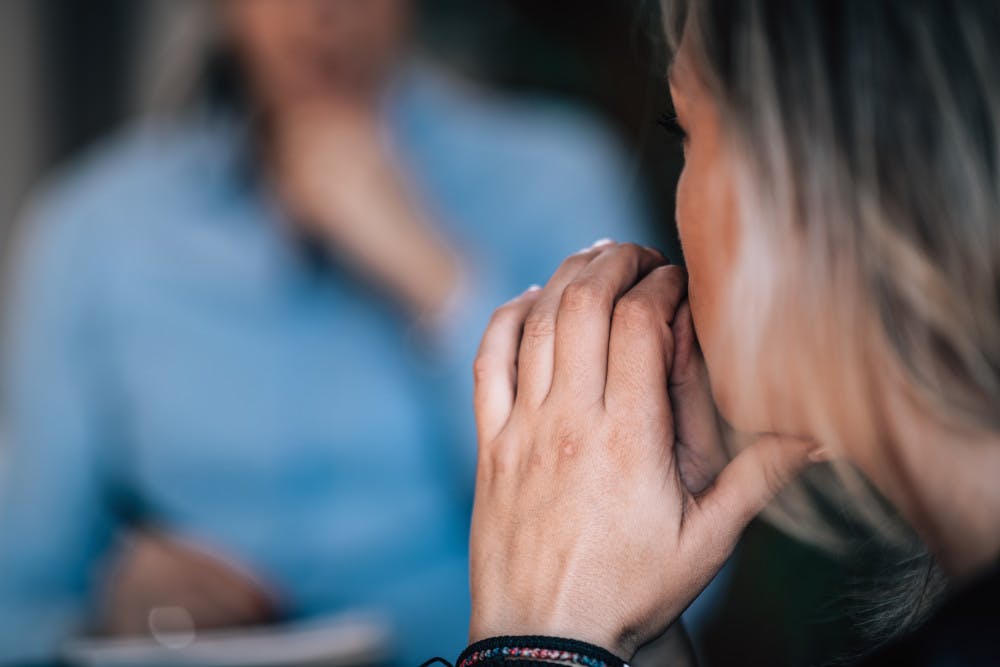By Rebekah Schroeder
Correspondent
Between walking to classes, interacting with peers and maintaining a busy schedule, Veronica Flesher’s days spent on campus always left her feeling calm and focused. But when the bustling campus emptied and students packed their bags to go home a few months too early, everything seemed to change.
“Everything has felt surreal for the past three weeks,” the senior journalism major said. “I'm prone to worrying and anxiety, so it's all really stressing me out.”

As COVID-19 continues to spread across the world, students are having difficulty adjusting to life in quarantine. This new normal has caused an influx of worry, hopelessness and depression. Between the looming specter of infections and the effects of social distancing, this global pandemic has created an environment where anxiety thrives.
“I can handle online instruction, but I wouldn't prefer it,” Flesher said. “I work a lot better in a classroom setting because I just need that kind of structure, so in order to do well, I have to be strict with what I can do and when. It's definitely just a huge bummer to be finishing my senior year like this, and for me, it's really personal.”
To limit the spread of this pandemic, the Centers for Disease Control and Prevention is encouraging social distancing. For some, this distancing practice has provided some much needed solitude — but for others, their mental health has taken a serious hit.
Angelo Vinco, a junior mathematics and secondary education dual major, understands the change twofold: both as a student and a Mental Health Services peer educator.
“We are all in this together and a lot of us share the same worries and anxieties about what is going on,” Vinco said. “Everyone had something cancelled or messed up because of the coronavirus and those feelings of frustration and anger are very valid. It is a very upsetting time.”
On top of helping students with their troubles remotely, Vinco has his own concerns about his mother, who works in a hospital among people exposed to the virus.
“I am always worrying for her health with everything that is happening around us,” he said.
Robbin Loonan, a licensed counselor at the College's Mental Health Services, has been adjusting to working from home and supporting students through a digital system.
“At this time, we’re providing a lot of outreach just to really make sure students are doing okay and also know that we’re here and available for them as needed,” she said. “With people working from home, each clinician can really make themselves available as they’re able and see what’s necessary for her students. We certainly try to accommodate their schedules, and in some ways, that might even be easier to do remotely.”
Although online therapy sessions are unfamiliar for many students, Loonan expressed the importance of taking advantage of any resource that the College is offering during this unprecedented time.
“(Students) can reach us online, they can request counseling services through their OWL account as well as on the mental health services web page, and they can also call and leave a message … online is the most direct access to getting connected with a therapist,” she said.
To avoid slipping into bouts of anxiety and depression, Loonan stressed the importance of maintaining a normal schedule by getting enough sleep, continuing basic hygiene, eating appropriately and exercising frequently.
Although it is crucial for students to distance physically, Loonan added that staying connected with friends is the best way to combat the feeling of isolation.
On Monday, March 30, Director of Mental Health Services Mark Forest sent out a campus-wide email that introduced new resources — online mindfulness sessions and guided meditation will now be available multiple times a week. These sessions will be held on Zoom, a popular web conferencing application that has been utilized for many online classes.
Despite the unprecedented circumstances, Flesher is taking things day by day and is determined to keep a positive, open mind.
“Yes, things are scary, and we don't really know what tomorrow will be like,” she said. “I just have to choose to not let it bother me. It can be really hard, and there are days where it doesn't work at all. Optimism is key. Things are bad, but we have to know that they will get better eventually.”







